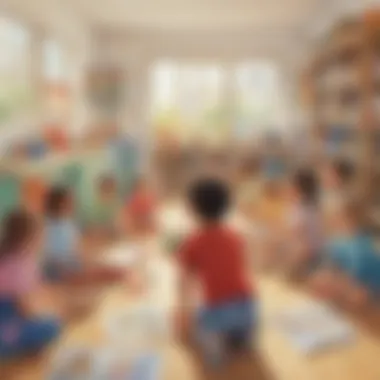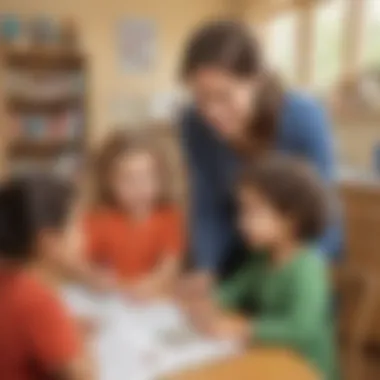Unlocking the Power of Early Education: The Role of Preschool Programs


Fun Activities Ideas
Preschool education is not just about academics; it's also about fostering creativity and imagination through fun activities. Indoor activities are essential, especially during unfavorable weather conditions. From building blanket forts to organizing pretend play sessions, indoor activities help children develop social skills and creativity. Outdoor adventures provide opportunities for physical exercise and exploration. Nature walks, scavenger hunts, and simple sports games all contribute to a child's physical development. Arts and crafts allow children to express themselves artistically. From finger painting to making DIY projects, these activities enhance fine motor skills and creativity. Science experiments engage children in hands-on learning experiences. Simple experiments like making volcanoes or exploring buoyancy spark curiosity and stimulate critical thinking. Cooking and baking are educational and enjoyable activities. Children learn about measurements, ingredients, and following instructions while creating delicious treats.
Educational Games
Incorporating math and logic games into preschool education helps children develop problem-solving skills and numerical literacy. From number puzzles to pattern recognition games, these activities encourage critical thinking. Language and vocabulary games are essential for building communication skills. Word matching games, storytelling sessions, and language building exercises enhance linguistic abilities. STEM activities introduce children to science, technology, engineering, and math concepts. Experimenting with simple machines or exploring basic coding principles lay a solid foundation for future learning. History and geography puzzles ignite interest in the world around us. Map puzzles, historical timelines, and cultural exploration activities broaden children's perspectives and knowledge. Interactive learning apps offer digital engagement while promoting educational content. Well-designed apps provide interactive experiences that reinforce various educational concepts.
Seasonal and Holiday Activities
Celebrating special occasions with Valentine's Day crafts fosters creativity and teaches children the value of expressing love and appreciation. From handmade cards to heart-themed decorations, these activities promote artistic expression. Halloween costume ideas encourage imaginative play and self-expression. Designing costumes, exploring spooky themes, and engaging in themed activities enhance children's creativity. Thanksgiving cooking projects involve children in meal preparation and teach them about gratitude and sharing. Cooking together builds family traditions and culinary skills. Christmas decorations activities inspire festive spirit and creativity. From crafting ornaments to decorating a tree, these activities bring holiday cheer and encourage collaboration. New Year's resolutions for kids promote goal-setting and reflection. Encouraging children to set achievable goals for the new year instills a sense of responsibility and personal growth.
Parenting Tips and Resources
Parents play a pivotal role in supporting their child's development and education. Understanding how to encourage creativity involves providing ample opportunities for exploration and expression. Setting up a playful learning environment involves creating spaces that stimulate learning through play-based activities. Balancing screen time and playtime is crucial in today's digitally immersed world. Limiting screen time and encouraging outdoor play create a healthy balance for children. Building strong family bonds is essential for a child's emotional well-being. Engaging in family activities, sharing quality time, and fostering open communication nurture strong relationships. Motivating kids to stay active promotes physical health and well-being. Encouraging children to engage in regular physical activities and sports fosters a lifelong commitment to fitness.
Fun Facts and Trivia
Integrating fun facts and trivia into preschool learning sparks curiosity and encourages exploration. Discovering facts about the animal kingdom introduces children to different species and their unique characteristics. Learning about famous inventions showcases human creativity and innovation throughout history. Exploring historical events for kids provides insights into the past and helps children understand the world's complexities. Unveiling mythical creatures stirs imagination and introduces children to legends and folklore. Delving into space adventures and discoveries ignites a passion for astronomy and science, fostering a sense of wonder and curiosity.
Introduction
Preschool education plays a vital role in laying the foundation for a child's future success. In this article, we delve deep into the significance of early childhood education, exploring the various aspects of preschool programs, teaching methodologies, and the profound benefits they offer young learners. By examining the critical role that preschool education plays in fostering early development and learning, readers will gain valuable insights into why investing in the early years is paramount. Through this comprehensive guide, we aim to shed light on the key elements that shape a child's educational journey.
Overview of Preschool Education
Definition of Preschool
The definition of preschool pertains to the initial formal learning experience a child receives before entering elementary school. It focuses on providing young children with a structured environment that stimulates cognitive, social, and emotional growth. This definition underscores the crucial role preschool education plays in setting the stage for a child's academic trajectory.
Historical Evolution
The historical evolution of preschool education traces back to early educational philosophies that recognized the importance of early childhood development. Throughout history, preschool programs have evolved to incorporate research-based practices that optimize learning outcomes for young children. Understanding this evolution is essential in appreciating the advancements that have shaped contemporary approaches to preschool education.
Role in Early Childhood Development
The role of preschool in early childhood development is multifaceted, encompassing not only academic preparation but also social and emotional enrichment. Preschool serves as a structured environment where children learn essential cognitive and interpersonal skills that form the building blocks of their development. Recognizing this pivotal role is crucial in comprehending the holistic benefits that preschool education offers.
Importance of Early Learning
Critical Period for Brain Development
The critical period for brain development during early childhood lays the groundwork for lifelong cognitive abilities. This phase is characterized by rapid neuronal growth and synaptic connections, making it a prime opportunity for acquiring foundational knowledge. Emphasizing the significance of this critical period underscores the invaluable impact of early learning initiatives on a child's cognitive development.
Cognitive and Social Development
Cognitive and social development in early childhood are closely intertwined, influencing a child's ability to navigate social interactions while acquiring new knowledge. The structured learning environment provided by preschool programs imparts essential cognitive and social skills that enhance a child's capacity to interact with peers and comprehend complex concepts. Exploring the interplay between cognitive and social development showcases the inherent value of early learning experiences.
Foundational Skills Acquisition
Foundational skills acquisition in preschool lays a solid groundwork for future academic success. From early literacy and numeracy skills to fine and gross motor abilities, preschool education focuses on developing a comprehensive skill set that supports a child's overall growth. By honing these foundational skills early on, children are better equipped to tackle academic challenges and cultivate a lifelong love for learning.


Benefits of Preschool Education
Academic Readiness
Preschool education fosters academic readiness by introducing children to fundamental concepts and building a strong educational base. The emphasis on early literacy, numeracy, and cognitive development equips children with the tools needed to excel academically in later years. This focus on academic readiness underscores the transformative impact that preschool education can have on a child's educational journey.
Socialization and Communication
Socialization and communication skills are pivotal aspects of a child's growth, and preschool acts as a catalyst for honing these abilities. Through interactions with peers and educators, children learn valuable communication techniques and social norms that facilitate positive relationships. The emphasis on socialization and communication underscores the role of preschool in nurturing well-rounded individuals who can thrive in diverse environments.
Independence and Emotional Regulation
Developing independence and emotional regulation are crucial components of preschool education that empower children to navigate challenges effectively. Preschool instills a sense of autonomy and emotional intelligence in children, encouraging them to express their feelings constructively and cope with various emotions. The focus on independence and emotional regulation emphasizes the holistic approach that preschool education adopts towards nurturing a child's emotional well-being and self-reliance.
Key Elements of Preschool Programs
Preschool programs encompass crucial components that play a fundamental role in shaping young minds for future success. These elements are designed to provide a comprehensive learning experience that aids in the holistic development of children. From curriculum design to teaching approaches and educational resources, each element is meticulously crafted to optimize early childhood education. Emphasizing the significance of these key elements in fostering early development and learning is essential in laying a robust foundation for children's growth.
Curriculum Design
Play-Based Learning
Play-based learning stands out as a cornerstone in preschool education, promoting a child-centric approach to learning that is both effective and enjoyable. This methodology harnesses the innate curiosity and creativity of children, allowing them to explore, experiment, and learn through play. The key characteristic of play-based learning is its ability to integrate essential skills development with engaging activities, thereby enhancing children's cognitive, social, and emotional abilities. Its emphasis on hands-on experiences not only fosters a love for learning but also cultivates problem-solving skills and critical thinking in young learners.
Literacy and Numeracy Focus
Literacy and numeracy focus within preschool programs concentrates on developing foundational skills in reading, writing, and mathematics. By emphasizing these core areas, children are equipped with the necessary tools to succeed academically and beyond. The key characteristic of this focus is its tailored approach to enhancing language and numerical skills through age-appropriate activities. It is a popular choice for preschool education as it lays the groundwork for future academic achievements and instills a lifelong love for literacy and numeracy.
Artistic and Creative Activities
Artistic and creative activities play a vital role in fostering self-expression, imagination, and innovation among young children. These activities encompass a wide range of experiences, including visual arts, music, drama, and more, allowing children to explore and express their creativity freely. The key characteristic of artistic and creative activities is their ability to nurture a child's imagination and individuality, promoting a holistic approach to learning. While fostering artistic talents, these activities also contribute to cognitive development, emotional intelligence, and overall well-being.
Teaching Approaches
Montessori Method
The Montessori method embodies a child-centered educational approach that emphasizes independence, freedom within limits, and respect for the child's natural psychological development. This holistic method encourages self-directed learning through hands-on activities and collaborative play. One of its key characteristics is the prepared environment that caters to each child's unique learning pace and style, fostering a sense of autonomy and decision-making skills. The Montessori method is a beneficial choice for this article as it focuses on nurturing a child's inner drive for knowledge and self-discovery, preparing them for a lifetime of learning and growth.
Reggio Emilia Approach
The Reggio Emilia approach is recognized for its emphasis on student-led, experiential learning that integrates arts, nature, and community engagement. This innovative approach views children as capable, resourceful individuals who are active participants in their learning journey. One of its key characteristics is the focus on collaborative projects that encourage exploration, creativity, and critical thinking. The Reggio Emilia approach is a popular choice for preschool education due to its promotion of inquiry-based learning, appreciation for diverse expressions of knowledge, and holistic development of children.
High
Scope Curriculum
The HighScope curriculum is founded on the principles of active learning and child-initiated experiences that promote positive outcomes in academic and social domains. This curriculum emphasizes hands-on exploration, problem-solving, and adult-child interactions that scaffold learning experiences. Its key characteristic lies in the 'plan-do-review' process, where children actively engage in planning their activities, executing them, and reflecting on their outcomes. The HighScope curriculum is a beneficial choice for this article as it values active engagement, social interaction, and personal responsibility, fostering a sense of agency and empowerment in young learners.
Educational Resources
Learning Materials
The provision of appropriate learning materials is essential in creating a stimulating learning environment that encourages exploration and discovery. Quality learning materials cater to diverse learning styles and interests, offering children hands-on experiences that reinforce conceptual understanding. The key characteristic of learning materials is their ability to enhance children's sensory experiences, motor skills, and cognitive development. They are a popular choice for this article as they support differentiated learning, encourage creativity, and facilitate holistic learning experiences.


Interactive Technology
Interactive technology plays a significant role in modern preschool education, offering engaging and interactive tools that supplement traditional teaching methods. These technological resources provide immersive learning experiences that captivate children's attention and enhance their comprehension of complex concepts. The key characteristic of interactive technology is its ability to adapt to individual learning needs, providing personalized feedback and scaffolding learning progress. While interactive technology offers numerous advantages in promoting digital literacy and problem-solving skills, its overreliance may limit children's social interactions and physical activities.
Parental Involvement
Parental involvement is a critical component of successful preschool education, as it establishes a strong partnership between parents and educators in supporting children's learning and development. Active parental engagement enhances children's school readiness, social skills, and academic achievements. The key characteristic of parental involvement is the collaborative relationship between home and school, where parents play an active role in their child's educational journey. It is a beneficial choice for this article as it reinforces the importance of family support, shared decision-making, and consistent communication to promote a child's overall well-being and educational success.
Parental Involvement in Preschool Education
Parental involvement in preschool education is a crucial factor in shaping a child’s early development and learning experiences. Parents play a fundamental role in supporting and enhancing their child's educational journey, both at home and in collaboration with preschool educators. By actively engaging in their child’s preschool education, parents can positively impact various aspects of their child’s growth and learning.
Supporting Learning at Home
In the context of supporting learning at home, parents are encouraged to participate actively in their child's educational activities outside of the preschool environment. This involvement includes engaging in extension activities, reading and storytelling sessions, and creating conducive learning environments that stimulate their child's cognitive and emotional growth.
Extension Activities
Extension activities play a vital role in reinforcing and extending the concepts taught in preschool. These activities are designed to complement classroom learning by providing opportunities for children to apply acquired knowledge in real-world settings. By engaging in extension activities, parents can facilitate their child's deeper understanding of academic subjects and foster a love for continuous learning.
Reading and Storytelling
Reading and storytelling are powerful tools for enhancing a child's language development, imagination, and cognitive skills. Through storytelling, parents can captivate their child's interest, instill moral values, and expand their vocabulary. Reading together promotes bonding between parents and children while nurturing a passion for literature and learning.
Creating Learning Environments
Creating enriching learning environments at home is essential for fostering a child's curiosity and creativity. Parents can design spaces that inspire exploration, discovery, and critical thinking. By incorporating educational materials, books, and interactive resources, parents can cultivate a conducive environment where children feel motivated to engage in independent learning and exploration.
Collaboration with Teachers
Effective collaboration between parents and teachers is instrumental in maximizing a child's educational outcomes and holistic development. By establishing clear communication channels, participating in school events, and understanding curriculum goals, parents can work cohesively with educators to create a supportive and conducive learning environment for their child.
Parent-Teacher Communication
Open and consistent communication between parents and teachers is essential for monitoring a child's progress, addressing concerns, and establishing a cohesive approach to their education. By maintaining a proactive dialogue, parents can stay informed about their child's academic and social development, enabling them to provide tailored support to enhance their learning experience.
Participation in School Events
Attending school events not only fosters a sense of community and belonging but also allows parents to actively engage with their child's educational experiences. By participating in school activities, parents demonstrate their support for their child's learning journey, contribute to a vibrant school culture, and strengthen their bond with the school community.
Understanding Curriculum Goals
Understanding the overarching goals and objectives of the preschool curriculum is essential for parents to align their efforts with educational expectations. By familiarizing themselves with the curriculum framework, parents can reinforce classroom learning at home, assist their child in achieving learning milestones, and collaborate effectively with teachers to ensure consistency in educational experiences.
Promoting Continuity of Learning
Promoting continuity of learning involves facilitating a seamless transition between home and school environments, encouraging curiosity and exploration, and supporting social development in children. By prioritizing these aspects, parents can nurture a holistic approach to their child's growth and ensure a harmonious learning experience that extends beyond the preschool setting.
Transitions between Home and School
Smooth transitions between home and school environments are essential for maintaining a child's sense of security, routine, and connection to learning. Parents can support these transitions by establishing consistent routines, fostering open communication with teachers, and preparing their child emotionally and mentally for changes in educational settings.
Encouraging Curiosity and Exploration


Encouraging curiosity and exploration empowers children to discover the world around them, ask questions, and seek answers through hands-on experiences. By fostering a sense of wonder and curiosity, parents can fuel their child's innate desire to learn, experiment, and make connections between theoretical concepts and practical applications.
Supporting Social Development
Supporting social development in children involves nurturing interpersonal skills, emotional intelligence, and empathy. Parents can facilitate social interactions, role-playing activities, and collaborative projects that promote teamwork, communication, and conflict resolution. By creating opportunities for positive social engagement, parents contribute to their child's emotional well-being and social competence.
Challenges and Solutions in Preschool Education
Preschool education plays a pivotal role in shaping young minds, but it is not without challenges. Understanding and addressing these challenges is vital for ensuring a successful early childhood education system. One significant challenge in preschool education is ensuring accessibility and equity for all children, regardless of their background or socioeconomic status. By focusing on this aspect, educators and policymakers can work towards creating a more inclusive and fair learning environment. Solutions to these challenges often involve implementing policies and initiatives that promote equal opportunities for every child to receive quality education.
Accessibility and Equity
Equality in Educational Opportunities:
Equality in educational opportunities aims to provide every child with the same chance to access quality education, regardless of their socioeconomic background. This concept emphasizes the importance of creating a level playing field for all children to learn and thrive. By ensuring equality in educational opportunities, preschools can contribute to breaking the cycle of disadvantage and empower children from all walks of life.
Addressing Socioeconomic Disparities:
Addressing socioeconomic disparities involves recognizing and mitigating the impact of economic inequalities on children's educational outcomes. By implementing strategies that support children from low-income families or disadvantaged communities, preschools can address these disparities and ensure that every child has the opportunity to succeed. This approach fosters a more inclusive and supportive learning environment where all children can reach their full potential.
Inclusive Learning Environments:
Creating inclusive learning environments involves celebrating diversity and accommodating the individual needs of every child. By embracing inclusivity, preschools can nurture a sense of belonging and acceptance among children from different backgrounds. Inclusive practices not only benefit students with diverse learning styles and abilities but also promote empathy, tolerance, and respect among peers. Building inclusive learning environments is essential for promoting social cohesion and cultivating a culture of mutual understanding and appreciation.
Quality of Early Childhood Programs
Quality early childhood programs are essential for providing children with a strong foundation for future learning and development. Ensuring the quality of these programs involves considering various elements, such as teacher training and certification, assessment practices, and strategies for continuous improvement. By focusing on these aspects, preschools can enhance the overall educational experience for children and support their holistic growth.
Teacher Training and Certification
Teacher Training and Certification:
Teacher training and certification are key components of high-quality early childhood programs. Educators who are well-trained and certified in early childhood education possess the knowledge and skills needed to create engaging and effective learning experiences for young children. By investing in teacher training and certification, preschools can elevate the quality of education they provide and ensure that children receive the best possible start in their academic journey.
Assessment and Accountability:
Assessment and accountability mechanisms are essential for monitoring and evaluating the effectiveness of early childhood programs. By implementing robust assessment practices, preschools can track children's progress, identify areas for improvement, and tailor instruction to meet individual learning needs. Accountability ensures that educators and institutions are held responsible for delivering high-quality education and meeting established standards. By prioritizing assessment and accountability, preschools can demonstrate their commitment to excellence and continuous improvement.
Continuous Improvement Strategies:
Continuous improvement strategies involve ongoing reflection, evaluation, and refinement of early childhood programs to enhance their quality and effectiveness. By incorporating feedback from teachers, parents, and other stakeholders, preschools can identify areas of strength and areas for growth. Implementing continuous improvement strategies allows preschools to adapt to evolving educational trends and best practices, ultimately benefiting the learning experiences of children. By fostering a culture of continuous improvement, preschools can stay responsive to the changing needs of young learners and provide them with the best possible start to their educational journey.
Community Engagement and Advocacy
Community engagement and advocacy are integral to promoting the importance of preschool education and ensuring the well-being of all children. By actively involving parents, educators, policymakers, and other stakeholders in the education process, preschools can build a strong support network that fosters children's growth and development. Furthermore, advocacy efforts play a critical role in advocating for policies and initiatives that benefit early childhood education and secure the resources needed to sustain high-quality programs.
Parental Empowerment
Parental Empowerment:
Empowering parents to take an active role in their children's education is essential for supporting positive learning outcomes. By providing parents with resources, information, and guidance, preschools can encourage parental involvement in their child's learning journey. Parental empowerment promotes a strong partnership between home and school, fostering a collaborative environment where children can thrive academically and socially.
Policy Initiatives:
Policy initiatives shape the landscape of early childhood education by providing guidelines, regulations, and funding opportunities for preschool programs. These initiatives play a crucial role in setting standards for quality education, promoting inclusivity, and addressing pressing issues in the field. By supporting policy initiatives that prioritize early childhood education, stakeholders can work together to build a comprehensive and sustainable framework that benefits all children.
Supporting Preschool Initiatives:
Supporting preschool initiatives involves championing programs and activities that enhance the quality and accessibility of preschool education. By advocating for funding, educational resources, and professional development opportunities, stakeholders can contribute to the success of preschool initiatives and ensure their long-term sustainability. Supporting preschool initiatives demonstrates a commitment to early childhood education and underscores the importance of investing in programs that lay the foundation for children's future success.



